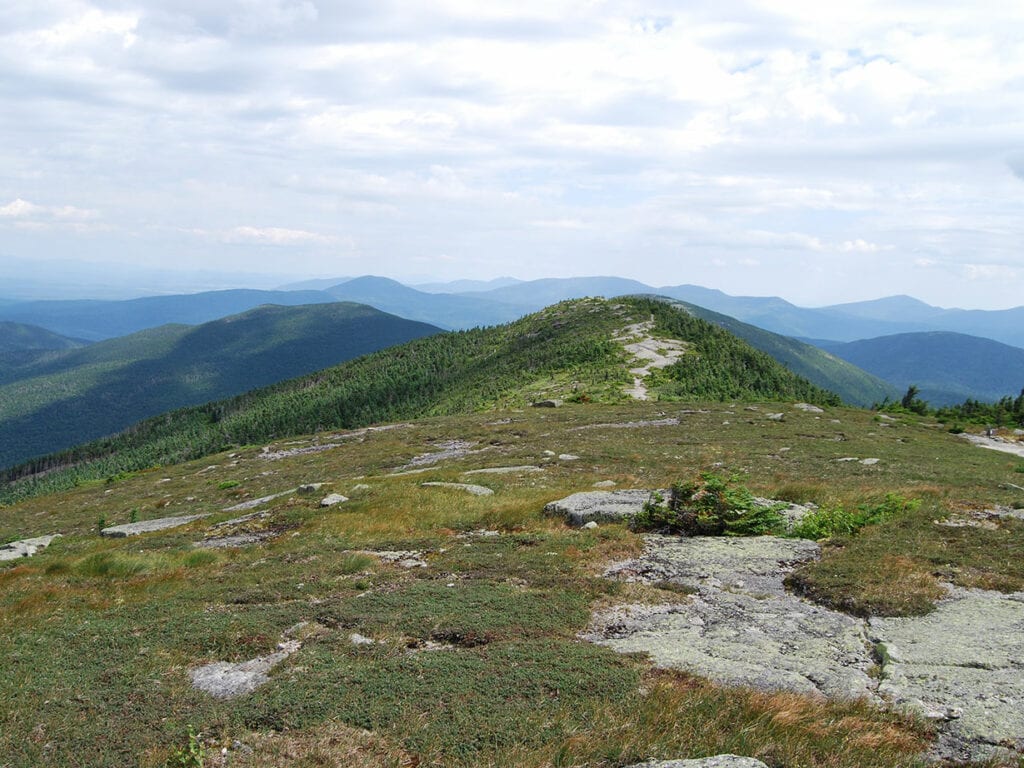Being active in the outdoors, and having a prior career in the outdoor industry, I’ve toyed with the idea of going for my Recreational Maine Guide license off and on over the years. With more spare time than usual over this past winter, I figured it was a good excuse to go for it.
First things first, for anyone interested in becoming a Guide, I highly recommend taking a class. While the Maine Department of Inland Fisheries and Wildlife (MDIFW) provides recommended resources and reading on its website, the experience of taking a class proved to be invaluable. MDIFW also has a list of course providers for each classification. My course was through Northeast Whitewater and took place at Saddleback. This was especially convenient and exciting because I worked part-time at Saddleback last winter, and a few coworkers did the course with me.

Saddleback Mountain by Pete Didisheim
Parts of the class covered the basics such as knots, map and compass work, and camping best practices. I’ve learned these basic skills over the years, but it was a good refresher and a way to kick old bad habits. What was even more valuable though was learning the elements of being a Guide that would have never crossed my mind. How to keep safe and entertain the rest of your group if tending first aid to someone, or guide ethics surrounding landowner permissions and how to treat the outdoors with respect. We even learned seemingly trivial things like how to react appropriately to the scenario of a 7-year-old child of a client picking an endangered plant such as a lady’s slipper on a hike. Most importantly, the course covered how to handle a variety of catastrophic events that could be encountered while guiding. As you can imagine, and perhaps have experienced, there is no shortage of things that can go wrong in the Maine woods.
After the class was over, it seemed like the work was just beginning. With just over a month until my exam, it was time to hit the books, maps, and plant and animal identification. Study habits seemed to have slipped since graduating college, but after putting hours of work into it, I felt cautiously optimistic going into my exam in Augusta.
After the written exam, the oral and practical exam covered topics such as navigation, camping best practices, a catastrophic event scenario, knots, paddling skills, and plant, bird, and animal identification. I could never quite tell how I was doing, but at the end of the exam I thought it was a good sign when the last question one of the examiners asked was, “What recipe do you follow when you make biscuits when camping?” Of course, the answer is the one on the side of the Bakewell Cream container.
Maine is a special place for outdoor recreation. While much of the state is in private ownership, we have several parcels of beautiful public lands. Thankfully, the Legislature provided $40 million in funding for the Land for Maine’s Future program this year for the first time in a decade, to help ensure more access to public land. This effort was supported by the Natural Resources Council of Maine and other environmental and conservation organizations throughout the state. For now, I have plans to use my Guide license on the side, but we’ll see where it takes me in the future, thanks in part to Maine’s special places.
—Jeremy Vroom, NRCM Rising Leadership Team member










Jeremy,
Good to see your continued enjoyment of the outdoors. Sounds like a great thing to do with your time.